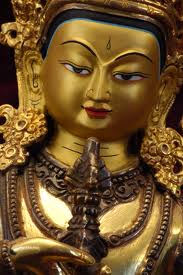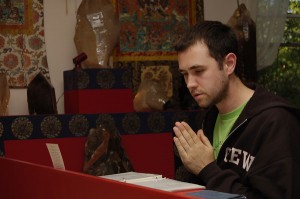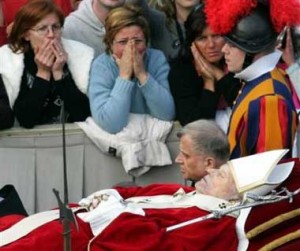The following is an excerpt from a teaching by Jetsunma Ahkon Lhamo offered during a Phowa retreat:
The signs that you must see in order to know that you are prepared for death have to happen now. They don’t happen before you die; they will not happen before you die. You will not have time at the moment of death to prepare for your death. That isn’t going to happen. So the signs that have to happen now must be received at this time. We want them now. This book, this preparation, this Ngöndro, which helps us to gather merit and helps us to purify karma, and helps us to make it possible for our minds to have the kind of quality to be able to hold, like a good bowl without a crack, such a practice, this is for now. Now is when you have to do this. The winds have to be purified now. The channels have to be unkinked now. Your mind has to be stabilized now. You have to learn not to be such whiners now. You have to learn to renounce cyclic existence now. You won’t have time at the time of death. You’ll have time for maybe a quick thought. If you’ve already practiced renouncing cyclic existence, at the moment of death you will have time to simply give all of that to the Three Precious Jewels. That you will have time for. That kind of inclination, that kind of giving, you will still, even after the elements dissolve, have the wherewithall to practice. But of course you will not have time to practice every aspect of the visualization and the prayers.
Forgive my language, but I have to scold you a little bit. Do you think that the Dharma was written by enlightened beings that were so anal, excuse me, that they said, “Well, if you do every one of these prayers, especially the ones that I’ve written, then we’ll let you in! But if not,…” What are you thinking! You know it’s not like that. It can’t be like that. That would not be logical or realistic or sensible. What superficial view of reality do we have if we hold such bizarre and crazy ideas? What we are doing now is to prepare ourselves—through gathering merit, through accumulating virtue; through purifying our inner winds, channels and fluids; through understanding what bardo is, through studying and contemplating the nature of cyclic existence including the bardo, through having preparation as to how the bardo experience will actually take place; through developing devotion. All of these things have to happen now. If you’re waiting ’til, oh, a week before you drop dead, what is that? First of all, you don’t know when that will be, and second of all, what’s a week? Even if you have that much time, you don’t have enough time during the course of a week, or month, or even a year. Preparation starts now, and you do what you can as quickly as you can with as much devotion as you have now. With as much devotion as you can now. So that’s what has to happen.
At the time of one’s death, if you are fortunate enough to have spent a long time dying, and you have been in the bardo of the condition of your death, which means that the cause of your death is already within your body and is active in your body, so you’ve known for a long time that you’re going to die… And let’s say you have the good fortune that a physician—this would have to be a heck of a physician, wouldn’t it—would come into your room and say, “Well, looks like four o’clock today. That’s what I say. Four o’clock you’re on your way out. Toes up kid, four o’clock.” And let’s say everything is perfect, and somewhere around two thirty you still have your mental faculties complete so you pick up your book and think, “I’m just going to open my practice.” This could happen. I mean, it could happen; but really, what is the likelihood? There’s no likelihood that that’s going to happen. The rarity of such a situation is ridiculous. Plus the fact that when people are getting ready to die they’re not at their best condition, you know. They’re not necessarily right with the program. There are some people that remain alert right until they cross that threshold. Lucky them, but it is not [usually] the case. So don’t you think that, since this Phowa was authored and given to us by those who have achieved enlightenment, who have practiced Phowa successfully, that they would have taken into consideration that this Phowa is written for you, for sentient beings? It is written for sentient beings that have not solved their problems yet, haven’t got renunciation down, haven’t got anything down yet. In fact, this kind of Phowa is kind of Last Hopeville. It’s really designed for those who could not practice generation and completion stage practices excellently. Those kinds of practitioners who can practice those practices excellently probably will not [need] the Phowa. So you must understand that this is not only possible, it is not only accomplishable, do-able, but is also necessary; and it is necessary for you to step back and have a proper view about it. Lighten up. Give yourself a break. Give me a break. It will come to you; We’ll get it done, don’t worry.
So, now that I’ve finished spanking you I’ll teach you some more. That’s not a bad spank, is it? Nah.
Copyright © Jetsunma Ahkon Norbu Lhamo All rights reserved



